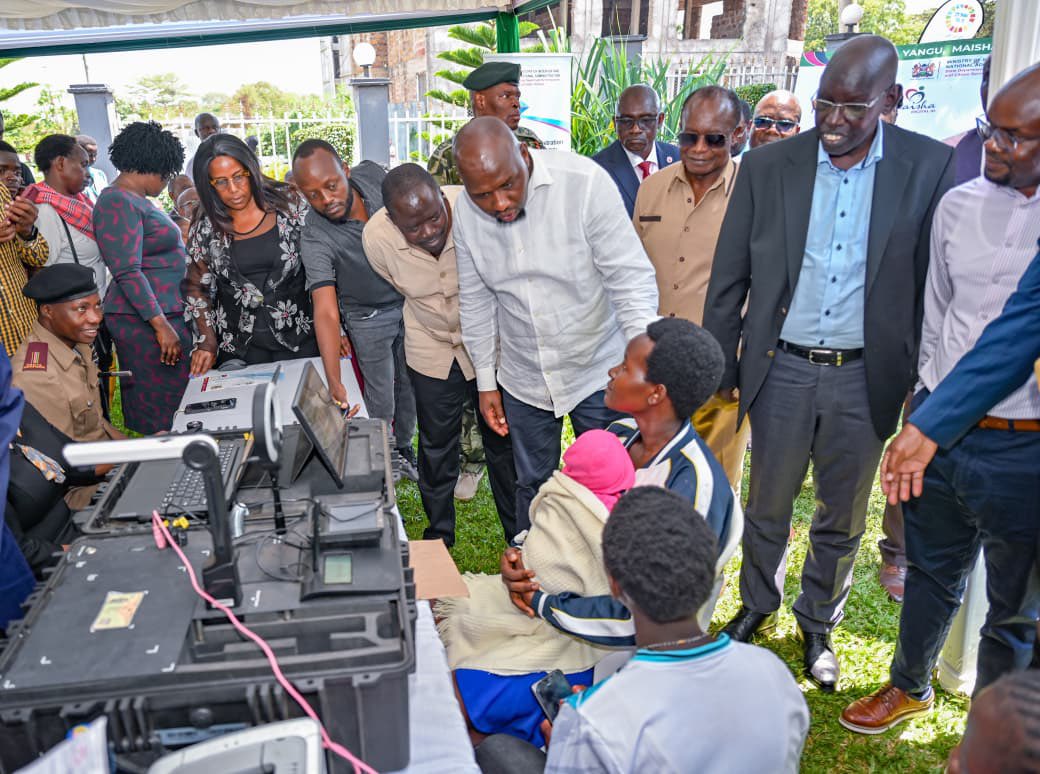Government scraps birth certificate authentication fees for IDs, passports

Murkomen said the directive takes effect immediately and is part of broader reforms to make identification services more accessible.
Kenyans seeking national Identity Cards (IDs) and passports will no longer be required to pay authentication fees for their birth certificates after the government announced new measures aimed at simplifying registration and eliminating unnecessary charges.
Speaking on Tuesday during celebrations to mark International Identity Day at Governor’s Park in Homa Bay Town, Interior Cabinet Secretary Kipchumba Murkomen said the directive takes effect immediately and is part of broader reforms to make identification services more accessible.
More To Read
- Government tightens ID registration checks after scrapping vetting process
- Kenyan students to get National IDs and be registered as voters automatically at 18 under new Bill
- Ruto waives ID replacement fees until after 2027 polls to boost voter registration
- New era in Wajir as students celebrate as ID cards arrive just one week after registration
- Court throws out ID fraud charges against man, faults prosecution over bungled case
- CS Ruku announces new Huduma Centre in Elwak, calls for mass ID registration in north eastern
“Effective today, the civil registration services will no longer charge any authentication fees for a birth certificate when applying for ID and passports. This step removes unnecessary financial barriers and aligns with our vision to simplify ID access,” Murkomen said.
The CS explained that the government has already rolled out a series of changes in the identity sector, including the free issuance of IDs for first-time applicants, decentralised passport processing, the abolition of extra vetting in border counties and faster service delivery.
“To ensure nobody is left behind, we are now embarking on a nationwide Usajili Mashinani exercise beginning with the marginalised regions. We have also scrapped authentication fees for birth certificates when applying for ID cards and passports,” he said.
In Homa Bay County, Murkomen revealed that six registries are already operational for issuing birth and death certificates, with two more expected to be opened within the next three months to expand access.
The CS further disclosed that the government is considering scrapping charges for both birth and death certificate applications entirely, in line with its agenda of ensuring that no Kenyan is denied documentation because of financial limitations.
To improve access further, he added that the government is reviewing the Sh1,050 fee currently charged for replacing lost or damaged IDs.
“We are also implementing a policy review to recognise and document small and unrecognised communities that still face systemic challenges in securing documentation. Every Kenyan counts, and every Kenyan must be counted,” Murkomen said.
He also announced that a simplified digital platform is being rolled out to allow Kenyans to apply for and track their ID applications online.
“We want to ensure that there is a seamless citizen-centric approach to the identity services,” Murkomen said, noting that more civil registration offices will be established across the country.
The CS urged Kenyans who have not applied for or collected their IDs to do so promptly, stressing that the documents will be vital for participating in the 2027 general elections. He also criticised some politicians who, he said, are attempting to discredit the government’s move to abolish ID vetting in North-Eastern counties.
Tuesday’s announcement builds on a directive issued by President William Ruto in March 2025, which ordered that IDs for Kenyans aged 18 and above be issued free of charge. The directive reversed a gazetted increase of fees in 2024 that had raised the cost of obtaining an ID for first-time applicants from Sh100 to Sh300.
“I want to announce here in Kibra today that IDs will now be issued free of charge. Every Kenyan should receive an ID without any form of discrimination,” Ruto said at the time.
The move came after public uproar and calls from the opposition, who had argued that the high costs locked out many Kenyans, particularly 18-year-olds, from accessing the crucial document.
During his Homa Bay visit, Murkomen also addressed security concerns and harmful cultural practices, linking them to rising cases of defilement and teenage pregnancies in the county and across parts of Nyanza.
“The prevalence of defilement cases here is also promoted by repugnant cultural practices, including disco matanga, which has been banned. Many of the children who are defiled are affected during the holidays,” he said.
A disco matanga is a vigil traditionally held at the home of a deceased person, but which often turns into an all-night dance gathering. Murkomen said such events expose unsupervised minors to sexual predators.
He warned against communities settling defilement cases out of court, especially where perpetrators are relatives, teachers, or religious leaders.
“These are high crimes; we do not want communities to hide perpetrators,” he said.
Murkomen said his ministry will collaborate with chiefs and their assistants to enforce the ban on disco matanga and dismantle community protection networks that shield offenders.
“We want to make sure that the entire society is supporting law enforcement agencies in dealing with cases of defilement and Gender-Based Violence, which is affecting many parts of our country,” he added.
Top Stories Today












































